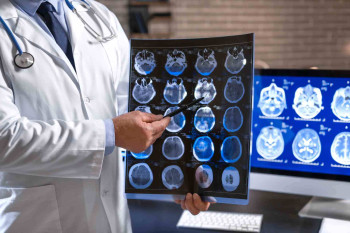Understanding Head Injuries: Types, Treatments, and More by Dr. Vikas Bhardwaj at AINS
Head injuries can range from mild to severe and can have serious consequences. As a neurosurgeon at Apex Institute of Neuro Spine (AINS), I have seen firsthand the impact head injuries can have on patients and their families.
In this blog, we will explore the different types of head injuries, their causes, symptoms, and treatment options to raise awareness about this important health issue.
Types of head injuries:
Concussion:
Definition: A concussion is a mild traumatic brain injury (TBI) that occurs when the brain is jolted or shaken.
Causes: Concussions can be caused by a direct blow to the head, a fall, a sports injury, or a motor vehicle accident.
Symptoms: Symptoms of a concussion may include headache, dizziness, confusion, memory loss, nausea, and sensitivity to light or noise.
Treatment: Most concussions resolve on their own with rest and avoiding activities that may worsen symptoms. However, it's crucial to seek medical attention if symptoms worsen or persist.
Skull Fracture:
Definition: A skull fracture is a break or crack in the bones of the skull.
Causes: Skull fractures can occur from a direct impact to the head, such as in a car accident or a fall.
Symptoms: Symptoms of a skull fracture may include pain, swelling, bleeding from the nose or ears, bruising, and difficulty moving the head or neck.
Treatment: Treatment for a skull fracture depends on the severity of the fracture. Mild fractures may heal on their own with pain management and rest, while more severe fractures may require surgery to stabilize the skull.
Intracranial Hemorrhage:
Definition: Intracranial hemorrhage is bleeding that occurs inside the skull, which can cause increased pressure on the brain.
Causes: Intracranial hemorrhage can result from a traumatic injury, such as a car accident or a fall, or from a medical condition that causes blood vessels to rupture, such as a brain aneurysm.
Symptoms: Symptoms of intracranial hemorrhage may include severe headache, nausea, vomiting, altered mental status, seizures, and loss of consciousness.
Treatment: Treatment for intracranial hemorrhage depends on the location and severity of the bleeding. It may involve surgery to remove the blood clot or repair the ruptured blood vessels, or other medical interventions to manage the increased pressure on the brain.
Treatment Options for Head Injuries:
Observation and Rest:
Mild head injuries such as concussions may only require observation and rest. Patients should avoid activities that may worsen symptoms, get enough sleep, and follow their doctor's instructions for recovery.
Medication:
Pain medications, anti-inflammatory drugs, and other medications may be prescribed to manage symptoms and reduce swelling or inflammation in the brain.
Surgery:
In some cases, head injuries may require surgical intervention. This may include repairing skull fractures, removing blood clots, or relieving pressure on the brain caused by swelling.
Rehabilitation:
Rehabilitation may be necessary for patients who have suffered more severe head injuries. This may include physical therapy, occupational therapy, speech therapy, and other forms of rehabilitation to help patients regain their abilities and improve their quality of life.
Here are 10 frequently asked questions (FAQs) about head injuries:
Q: What are the common causes of head injuries?
Head injuries can be caused by various factors, incincluding falls, motor vehicle accidents, sports-related injuries, assaults, and other traumatic incidents.
Q: What are the symptoms of a head injury?
Symptoms of a head injury can vary depending on the type and severity of the injury but may include headache, dizziness, confusion, memory loss, nausea, vomiting, an altered mental status, difficulty speaking or moving, and loss of consciousness.
Q: How are head injuries diagnosed?
Head injuries are typically diagnosed through a combination of physical examinations, imaging tests (such as CT scans or MRIs), and assessment of symptoms and medical history.
Q: What are the different types of head injuries?
Common types of head injuries include concussions, skull fractures, and intracranial hemorrhages (bleeding inside the skull).
Q: How are concussions treated?
Most concussions resolve on their own with rest and avoiding activities that may worsen symptoms. However, medical evaluation and monitoring may be necessary, and in some cases, medication may be prescribed for symptom management.
Q: Do all head injuries require surgery?
No, not all head injuries require surgery. Treatment options depend on the type, severity, and location of the injury. Mild injuries may only require observation and rest, while more severe injuries may require surgical intervention.
Q: Can head injuries have long-term effects?
Yes, head injuries, especially severe ones, can have long-term effects on physical, cognitive, and emotional health. These may include persistent headaches, memory problems, difficulty concentrating, mood changes, and other cognitive or behavioral issues.
Q: How can head injuries be prevented?
Head injuries can be prevented by taking precautions such as using appropriate protective gear during sports or recreational activities, following safety guidelines in the workplace, using seat belts in vehicles, and avoiding risky behaviors.
Q: When should I seek medical attention for a head injury?
You should seek medical attention for a head injury if you experience severe symptoms such as loss of consciousness, persistent headache, vomiting, difficulty speaking or moving, or if the injury was caused by a high-impact incident like a car accident or fall.
Q: Can children have head injuries?
Yes, children are also susceptible to head injuries, and parents should be vigilant in preventing head injuries in children by ensuring they use appropriate safety gear, supervising them during activities, and seeking medical attention if a head injury occurs.
In conclusion
Head injuries can have serious consequences, and prompt medical evaluation and appropriate treatment are crucial. It's important to take preventive measures and seek medical attention if a head injury occurs, especially if there are concerning symptoms or if the injury is severe. Consulting with a healthcare professional, such as a neurosurgeon at a reputable hospital like AINS (Apex Institute of Neuro Spine), can provide a proper diagnosis, treatment, and guidance for a full recovery.

























